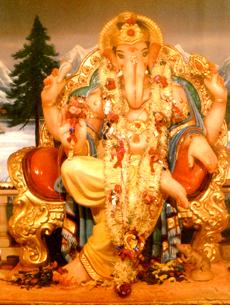GANESHA
AND SHIVA |
|
Ganesha's origin through his mother, obviously is a reference to the prevedic matriarchal society where he was already a Deity along with female Deities under the overall supremacy of his mother Parvathy, known as Ambal, the Magna Mater of the Universe. Shiva enjoyed the status of a consort and nothing more, before her. But he was the lord of Yoga. As the lord of yoga, he had a good following. During the vedic period his followers were seen having long hair and because of this they were called Kesins. They did not follow vedic rites. They wandered about as Saiva ascetics carrying waterpots in their hands. These wandering mendicants were known as vratyas (one who renounced vratas or rites). As they attained many mystic powers, by their meditative practice they were feared and avoided by the vedic priests like poisonous snakes. The reference of the great serpent Vratra who intercepted waters and light of the vedic priests may be a reference to these in the vedic literature. Karthikeya the Second son of Shiva did not attain the stature of Ganesha in the Hindu Pantheon. When upanishads came to be written about fifteen of them were devoted to the lord of Kailas. One Upanishad by name Ganapathyopanishad was exclusively devoted to Ganesha. Till then he had a mixed reception. Even Manu referred him only as a Deity of the Sudras. "Vinayaka Shudra Devatha". This reference about him clearly indicates that he was not acceptable to Brahmin Communities who performed yaga or sacrificial ceremonies. Ganapathyopanishad placed Ganesha on a par with Shiva and he was also considered as a tutelary Deity of yoga. |
 The
son of God conception is not foreign to Hinduism. Hindu mythology credits
Shiva with two sons. The elder one is Ganesha, the younger one is Karthikeya.
There is however some difference in the mode of their genesis. Ganesha
is the creation of Parvathy without participation of her consort Shiva
and Karthikeya is the creation of Shiva Without the participation of Parvathy.
But both Shiva and Parvathy own their parentage notwithstanding their
peculiar and separate immaculate origin.
The
son of God conception is not foreign to Hinduism. Hindu mythology credits
Shiva with two sons. The elder one is Ganesha, the younger one is Karthikeya.
There is however some difference in the mode of their genesis. Ganesha
is the creation of Parvathy without participation of her consort Shiva
and Karthikeya is the creation of Shiva Without the participation of Parvathy.
But both Shiva and Parvathy own their parentage notwithstanding their
peculiar and separate immaculate origin.